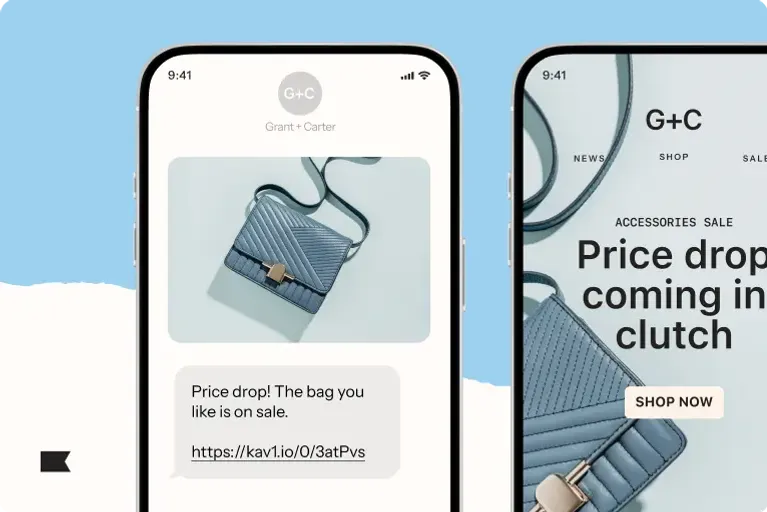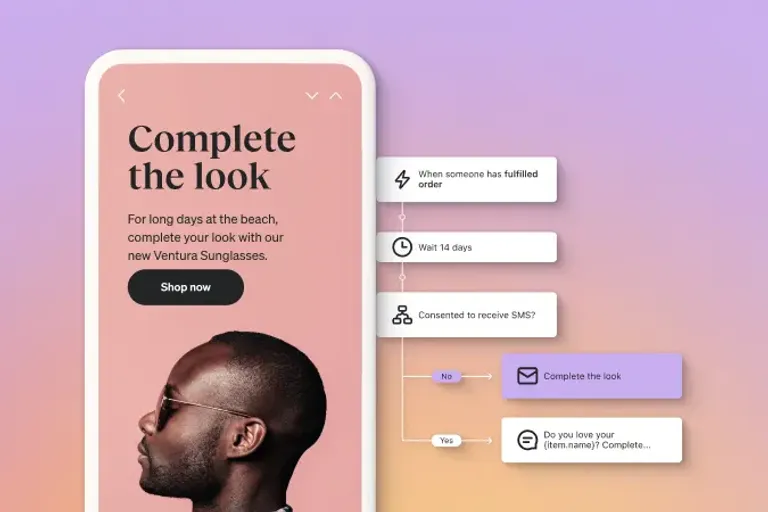Today, people are so attached to their phones that they’re almost an extension of the human body.
The dramatic shift in how we communicate has made short message service (SMS) one of the best ways to reach customers. According to Klaviyo’s recent consumer survey of 2,000 UK consumers, 77.5% of people who subscribe to SMS marketing have made a purchase—and 29.2% say they often make purchases from texts.
So what does this mean for ecommerce brands? If you’re looking for strategic ways to reach your customers, SMS marketing is a must.
Success in SMS marketing results from setting mini goals and gradually expanding the number of use cases across the buyer journey. From baby steps to a big leap forward, this crawl, walk, run approach—built from the best practices of 13K+ leading brands that use Klaviyo SMS—can help you nail your SMS marketing from day one.
Ready to learn how to build out your SMS marketing strategy?
UK consumer stats about SMS marketing
In addition to proving that most consumers want to receive texts from brands, Klaviyo’s consumer sentiment survey also found that 73% of consumers have made a purchase based on receiving a text message from a brand—and over half of them have done so 2-3x.
Meanwhile, 95% of consumers subscribe to less than 7 brands via SMS—which means if you have their number, they really want to hear from you.
Importantly, leading ecommerce brands are already acting on these trends.
According to Klaviyo’s recent marketing mix report, 30.47% of all ecommerce businesses and over half of businesses that make $20M+ in annual revenue are now using SMS as a marketing channel. The mid-market businesses that use SMS are investing nearly a fifth of their marketing budgets into the channel—almost as much as they spend on paid search and paid social.
So, is SMS marketing right for your business? If you’re looking for ways to send time-sensitive messages, reminders, and notifications, personalise your interactions with customers, and cultivate more meaningful, long-term relationships with them, the answer is probably yes.
“SMS is a channel merchants need to contemplate leveraging when delivering a seamless omnichannel shopper experience,” says Sharon Gee, vice president, revenue growth and general manager of omnichannel at BigCommerce. “A well-orchestrated SMS marketing strategy provides unique engagement opportunities that span use cases from shipping and delivery notifications to customer support, to personalised clienteling and upselling.”
SMS is a channel merchants need to contemplate leveraging when delivering a seamless omnichannel shopper experience.
As a marketing channel, SMS offers several unique benefits, including:
- Speed, ease, convenience, and immediacy
- More meaningful and personalised customer experiences
- The ability to have two-way conversations with customers and potential customers
- Ownership of the relationship with subscribers—which means no data privacy issues
“The data speaks for itself—consumers engage with SMS faster than email,” says Jen Brennan, director of digital strategy at Northern Commerce. “It’s a natural complement to any brand’s owned marketing strategy.”
Overcoming SMS marketing barriers—and fears
Of course, adding new channels to your marketing mix is no easy feat. You always need a sound implementation strategy, as well as a measurement plan to understand and maximise your return on investment (ROI).
SMS marketing is often seen as scary due to its strict compliance rules and regulations, which differ based on region. “Some brands are fearful about starting with SMS because they’re concerned if they send a customer a text they will get sued,” says Josh Mendelsohn, director of product marketing at Klaviyo.
But in reality, “SMS is just another form of permission marketing, like email,” Mendelsohn explains. “If you get consent correctly, respect sending hours, and allow people to opt out in accordance with local laws, you’ll be able to take advantage of SMS as a great marketing channel.”
Beyond litigation, though, SMS marketing myths abound. Many ecommerce brands may perceive other barriers to exploring SMS marketing, including:
- Uncertainty about whether customers want to engage via SMS
- Too many tools and channels
- Conflicting attribution data
- Cost
Different SMS marketing platforms and tools address each of these concerns differently. Klaviyo, for example, is a unified customer communications platform for managing both email marketing and SMS marketing side by side, as well as on-site forms and overall customer data. This approach not only gives you a holistic view of customer engagement and preferences, but also solves conflicting attribution issues.
Should you focus on SMS instead of email?
On that note: SMS and email are not mutually exclusive. The most effective SMS programs don’t replace your email marketing program but rather enhance it based on each channel’s unique strengths.
“Don’t treat your SMS like your email program,” says Morgan Mulloy, associate director of email marketing at Avex Designs. “Email is more of an ‘interact at your leisure’ channel, whereas SMS is intrusive. It’s literally at the palm of your customer’s hand. SMS is not the ‘blast every day’ channel. It’s the ‘quality over quantity’ channel.”
Creating synergy between email and SMS, then, can help you reach your marketing goals while providing a cohesive customer experience across various channels. By adding SMS to your email marketing strategy, you can reach people who may not have taken a certain action or who simply prefer to hear from you via text.
Consider Mixtiles, an Israel-based home decor brand that turns photos into decorative wall tiles. By unifying their email and SMS communications in one marketing platform, Mixtiles was able to create a consistent customer experience without a significant investment of time or financial resources.
Now, 40% of Mixtiles’ revenue comes from email and SMS.
Of course, email marketing has been around a lot longer than SMS marketing. And every time businesses try something new, the best advice is to go slowly—take baby steps.
That’s exactly what the “crawl, walk, run” method is all about: first learning the basics, and then gradually increasing the complexity of use cases until you’re ready to apply SMS across the board.
Let’s dive in.
Crawl: Set up your list, welcome subscribers, and learn how to measure SMS performance
To make the most out of your SMS program, you have to start with the basics:
- Encouraging subscribers to join your SMS list
- Creating a welcome series
- Growing your SMS list
- Making optimisations along the way
Here’s what the “crawl” stage looks like.
1. Ethically incentivise customers to join your SMS list
Without a solid subscriber list, all your SMS marketing efforts can go to waste.
“Collecting SMS opt-ins is only going to be more competitive, harder, and more costly as time goes on,” points out Joseph Hsieh, founder of Retention Commerce. “Even if you don’t plan on a full-board SMS program, capturing SMS opt-ins and using them sparingly is a great start for any brand that has yet to do it.”
But building an SMS list is no easy task. Unlike many other marketing channels, SMS requires consent.
This means you have to ask customers for permission before enrolling them on your SMS list. In the US, the Federal Communications Commission implements and enforces laws—like the TCPA and CAN-SPAM—that regulate SMS marketing to protect customers’ rights.
It’s imperative, then, that you grow your SMS subscriber list and send your text messages in a way that’s compliant with applicable laws, industry guidelines, and carrier requirements.
The easiest way to do that? Partner with an SMS marketing platform that takes compliance seriously.
How to auto-generate your own mobile terms of service in Klaviyo
In addition to generating a mobile device terms of service (TOS) that you can customise to fit your needs, Klaviyo can also host the TOS for you. Then, you can add a link to your TOS anywhere—like forms where you collect SMS consent.Alternatively, you can copy TOS text and paste it into another page, like your existing TOS page.
Here are a few ways to motivate customers to join your SMS list:
- Create a unique offer that’s only available to SMS subscribers.
- Give customers a time-sensitive deal, like buy one, get one (BOGO) for the rest of the day on items you need to clear out.
- Send information that’s necessary to customers who might want to participate in an event.
- Introduce new products or services—and give your SMS list first dibs.
2. Create an SMS welcome automation
First impressions matter. That’s why it’s critical to build your SMS welcome automation so it’s ready when subscribers opt in.
The role of a good welcome text is to educate new subscribers about your brand and products, familiarise your target audience with the content and frequency of your communications, and even inspire the first purchase.
Out of all SMS marketing automations, or flows, the SMS welcome series is often the No. 1 revenue generator for ecommerce brands, according to a recent analysis of 400 Klaviyo SMS customers.
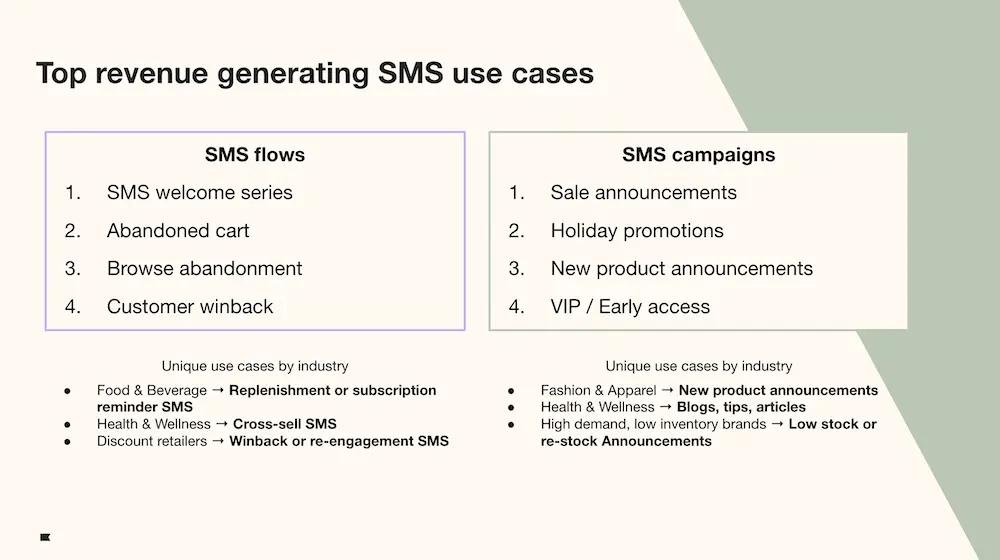
Whether your SMS welcome automation is one text or a multi-part series, follow these best practices when creating it:
- Set it up to send immediately after someone opts in.
- Include your store name.
- Personalise the text message with your subscriber’s first name.
- Thank subscribers for joining your SMS list.
- Provide a clear call to action (CTA).
3. Grow your SMS list
A solid SMS list growth strategy requires always looking for opportunities to ask customers to opt in—without interfering with the user experience.
Here are a few ways to accomplish that.
Leverage the online check-out experience
Adding SMS consent collection to check-out allows customers to accept SMS marketing while filling out their delivery information. It’s a seamless, non-intrusive way to encourage customers to join your subscriber list.
With an SMS marketing platform like Klaviyo, which has built-in integrations with leading ecommerce platforms like Shopify, WooCommerce, and BigCommerce, prompting SMS opt-in during check-out is an easy way to reach a wider audience with your SMS marketing strategy.
The best part? The customer does not need to complete their order for Klaviyo to sync their consent. That means you grow your SMS list—even if someone abandons their cart.
Incentivise website visitors to become subscribers
A good rule of thumb when setting up an SMS sign-up form on your website: Use strategic targeting to show SMS-only forms for visitors who are already on your email list.
When mattress and bedding company GhostBed took this approach, they earned over $44.K from their SMS welcome series in just 2 weeks.
Ghostbed created two different pop-up forms targeting two distinct audiences:
- Email subscribers: This form targeted current email subscribers, asking only for their phone numbers.
- Non-subscribers: This form targeted new site visitors, collecting both email addresses and phone numbers.
Both forms offered a 25% discount, 2 free pillows, and early access to new deals and promotions coming in the future.
The result: 4.2K new SMS subscribers, and a sign-up rate of 3.8%.
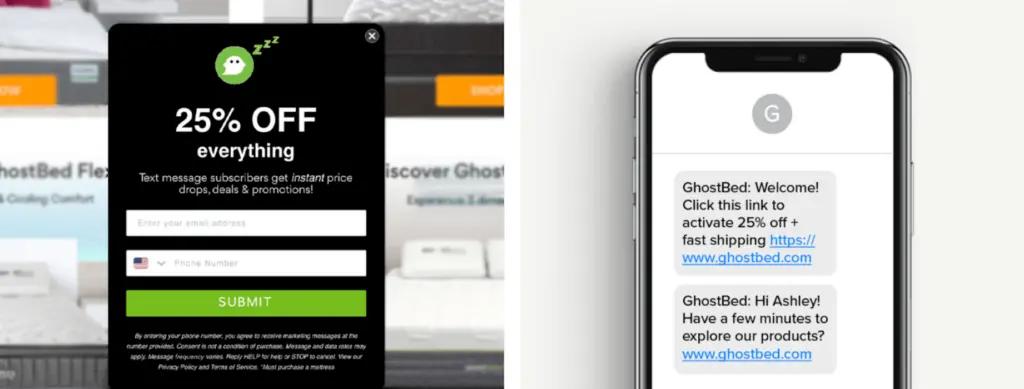
Another best practice is using multi-step forms to collect email and SMS in separate steps—first email, then SMS consent. This way, if a visitor only completes step one, you’ll still be able to reach them via email—and can encourage them to subscribe to SMS marketing in the future.
Target existing email subscribers
Tap into the potential of your email subscribers by asking this audience to enrol in your SMS list, too. Send occasional email campaigns to non-SMS subscribers, letting them know there are rewards or benefits in store when they join the SMS club.
In this email campaign, for example, hair care brand It’s a 10 Haircare entices email subscribers to join their VIP SMS club by promoting a 15% discount on future purchases—as well as access to exclusive giveaways, sales updates, and ongoing promotions.
4. Measure early performance rates
The only way to see what works for your business is to measure the performance of your SMS program on an ongoing basis.
According to Klaviyo’s latest SMS marketing industry benchmarks, you should aim for 8.5% click rates and .14% conversion rates on your SMS campaigns.
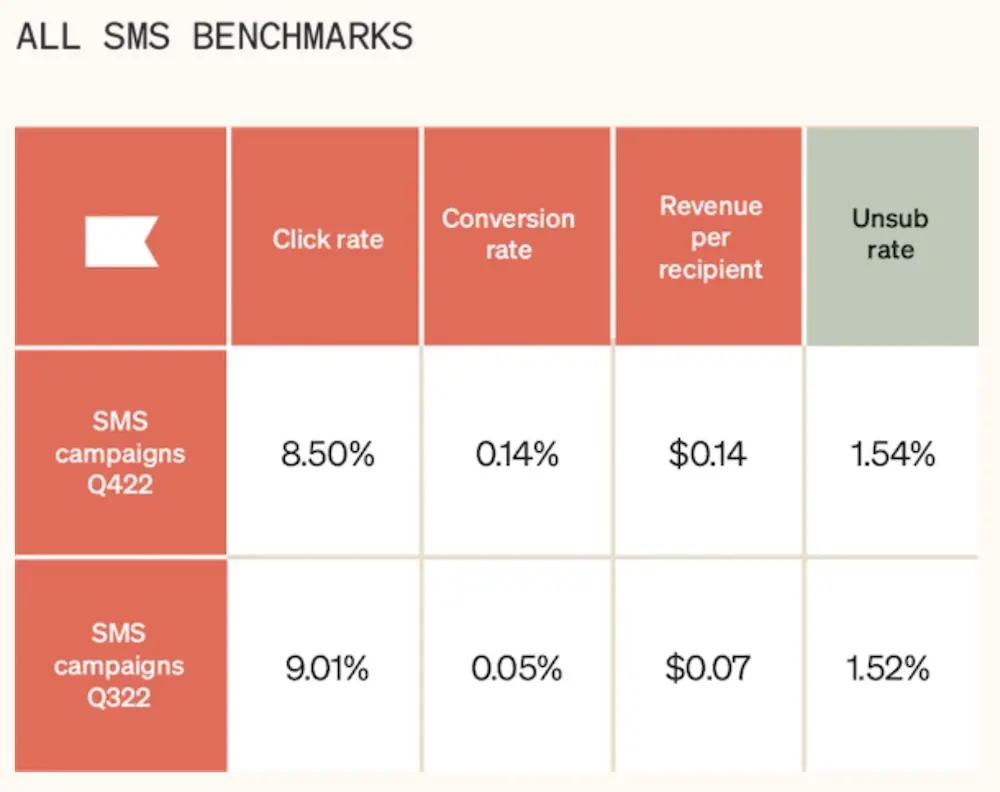
If your texts are earning sub-par numbers, try making some adjustments by A/B testing your SMS marketing messages.
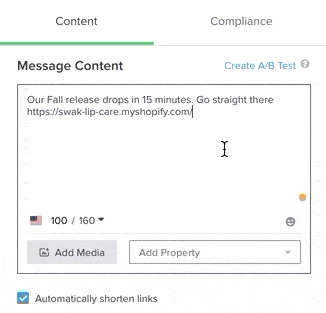
In the beginning stages of your SMS program, you can A/B test SMS marketing elements like:
- Timing
- Number of messages
- Type of message
Walk: Launch a campaign, add more SMS automations, and integrate SMS with email
Once you lay the foundation of your SMS marketing strategy, it’s time to enter the “walk” stage and integrate SMS throughout the customer journey.
From your first SMS marketing campaign to messages for cart abandonment and new product announcements, this stage is where SMS becomes a pivotal component of your digital marketing strategy.
What’s the difference between a campaign and a flow?
Campaigns are typically one-off sends for specific holidays, sales, or the like. Automations, or flows, are messages that go out automatically based on triggers like birthdays, engagement on a website, and more.
1. Send your first SMS campaign
After 1-3 weeks of collecting SMS subscribers, you can kick things off with a campaign for all your new SMS subscribers.
A few things to include in your first campaign:
- Your company name
- A single, time-sensitive CTA
- The subscriber’s first name, or other relevant information
- A conversational tone
- Immediate value
If it will enhance your message, add an image or GIF that is under 600 KB. This will convert the message into an MMS, which also allows you more than 1,600 characters. Just remember that MMS messages cost more than SMS messages under most billing plans.
2. Use SMS to recover abandoned shopping carts
According to Baymard, 70% of online shoppers abandon their carts. That’s a huge opportunity to recapture lost revenue.
The good news: SMS is one of the best ways to encourage visitors to finish their purchase. According to Klaviyo data, SMS abandoned cart flows generate the most revenue after the welcome series.

In a platform like Klaviyo, you can use SMS to follow up on an abandonment cart email to increase your shopper’s chances to complete their purchase—while also diversifying your messaging strategy.
3. Bring customers back to buy more via SMS
SMS is a great marketing tool for personalised recommendations based on products customers have already purchased from your brand.
By leveraging your customers’ past purchase data in a post-purchase or win-back email flow, you can encourage them to buy related items or higher-end products that go well with their existing purchases.
4. Use SMS campaigns for new product announcements
Keep your SMS subscribers in the know by showcasing new collections and product launches via text. To make the experience feel special, you might even try offering SMS subscribers early access or first dibs when new products drop.
5. Review your SMS performance rates
As you continue implementing text marketing, be sure to follow campaign performance so you can further test, optimise, and improve.
If your numbers are lower than Klaviyo benchmarks, consider A/B testing different ideas, such as:
- Promotional vs. conversational copy
- Discount amount or timeframe
- SMS vs. MMS
- Urgent language
Run: Explore two-way SMS, increase personalisation, and improve customer loyalty
If you’re nailing your SMS basics and reaping the benefits of combining your SMS and email programs to drive more sales and grow your subscriber lists, it’s time to take your game even further with advanced SMS strategies.
The “run” stage is focused on building trust, engaging customers, and establishing brand loyalty over time.
1. Engage customers with time-sensitive SMS messages
Taking SMS to the next level means reaching customers at the right time, with the right message. This is where time-sensitive SMS messages come in handy.
SMS price drop alerts
The price drop notification is perfect for SMS, as it requires subscribers to act fast and take immediate action. Make this flow mobile-exclusive by using filters to send only to SMS subscribers.
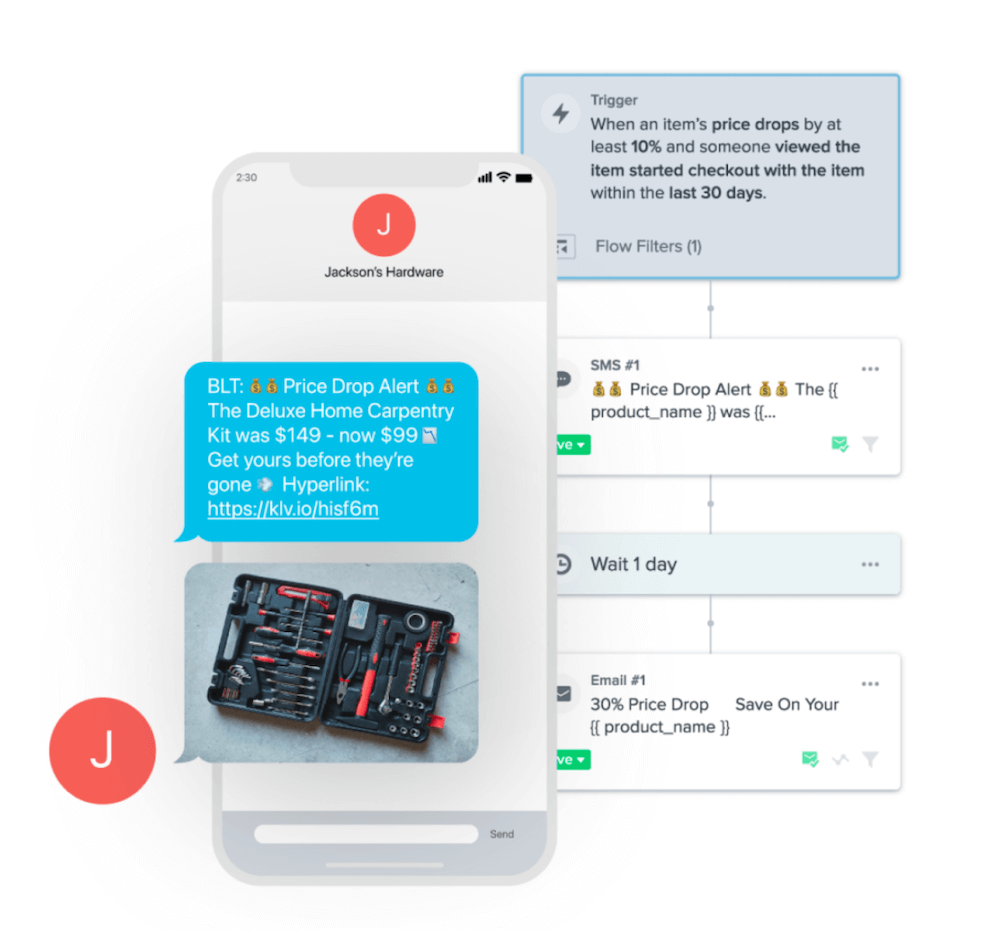
SMS back-in-stock alerts
Another type of effective time-sensitive message: back-in-stock alerts. Deliver them as one-off campaigns to targeted segments who’ve shown interest in an out-of-stock product that’s now back and ready to ship.
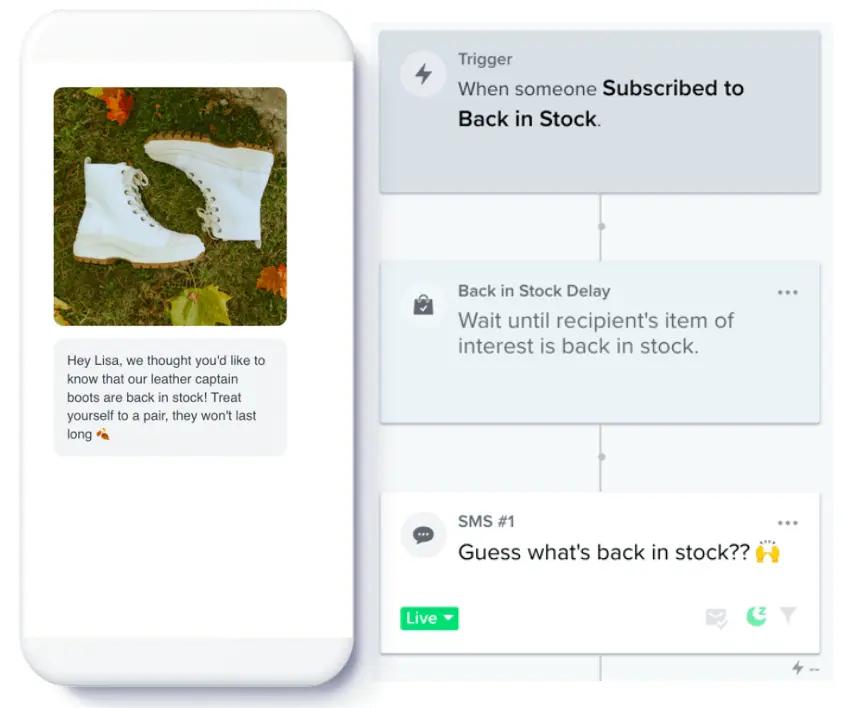
2. Use your SMS marketing strategy to create a stellar post-purchase experience
SMS is not only effective for driving sales. It’s also a great tool for improving the post-purchase experience.
Rounding out your strategic SMS program with transactional SMS messages such as shipping delay notifications, billing updates, and appointment reminders can help you exceed customer expectations.
Once a product is delivered, you can also use SMS to share valuable information directly to customers’ phones instead of hoping they’ll see it in their crowded email inbox. A few ideas, here:
- Provide tips and tricks for best results.
- Share a link to a tutorial video.
- Highlight customers using the product.
- Send VIP status or loyalty points reminders.
3. Provide real-time customer support with SMS help desk integrations
Strong communication is the backbone of every successful relationship. The messages you send to your audience can make or break those relationships.
By using conversational SMS, you can communicate with your customers on a 1:1 basis, answering questions and providing support in real time.
The easiest way to do this is to integrate SMS with your help desk software, such as Gorgias or Zendesk. This makes it easy to see and respond to incoming responses to your texts from customers as help desk tickets, and encourage customers to respond to your messages so your support agents can help your customers without having to toggle between applications.
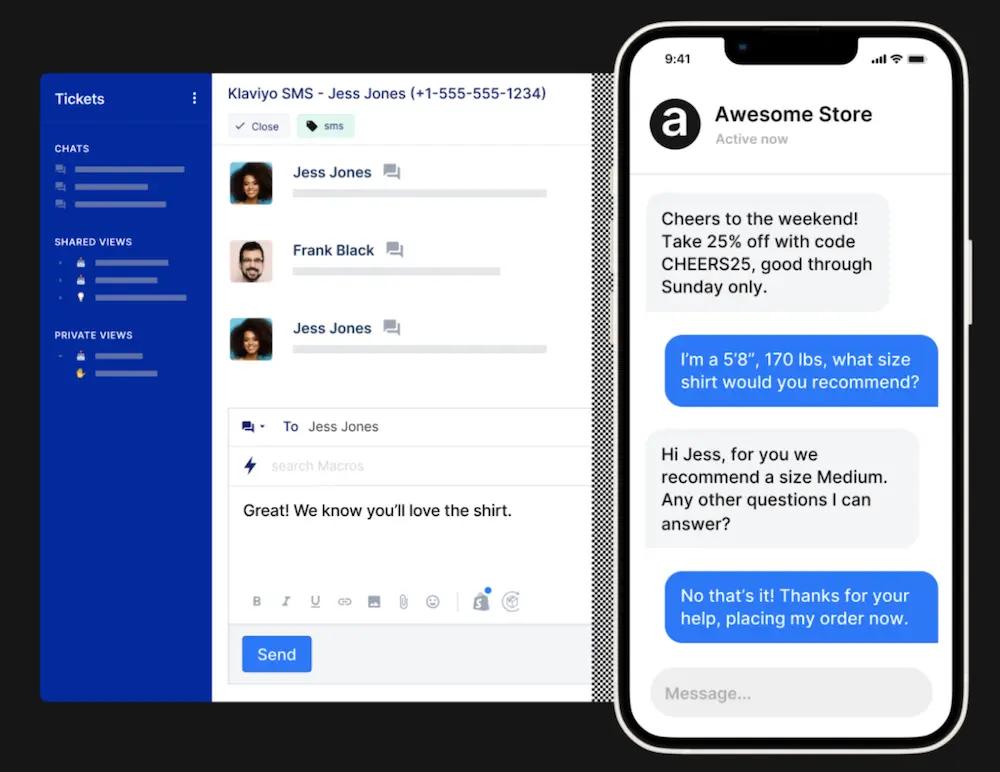
Two-way texting still requires consent
You will also be able to view texts from non-subscribers, but to adhere to laws pertaining to SMS consent, you will not be able to reply to anyone who has not opted in to your SMS marketing efforts.When non-subscribers text you, it does not count as consent for SMS marketing unless they explicitly opt in.
4. Personalise SMS using targeted segments
When you build a solid SMS list and reach a more advanced phase with your SMS marketing strategy, don’t forget to think about targeting. Batch and blast SMS campaigns, also known as bulk SMS sends, are a surefire way to drive opt-outs and complaints.
Instead, use segments to identify customer preferences and send more targeted messages that speak to subscribers’ individual interests.
A few ideas for SMS segments include:
- Past engagement
- Browsing behaviour
- Purchase history
- Purchase intent
- Geographical location
- Loyalty status
Ready to add SMS to your marketing strategy?
Adding SMS to your owned marketing channels doesn’t have to be scary.
The more you experiment with SMS as a marketing channel, the better you’ll be able to understand what resonates with your customers—and tailor an effective text message marketing strategy that turns transactions into lifelong relationships.
Want to go beyond the basics? We cover everything you need to know to make sure you start from a place of value and end with loyal, lifelong customer relationships in this ecommerce SMS marketing series. Check out:
- What is SMS marketing?
- 5 of the best SMS marketing platforms compared
- The Power of Combining SMS & Email marketing
SMS marketing strategy FAQs
How is SMS marketing effective?
SMS marketing is effective because consumers want it. Here’s proof from Klaviyo’s consumer sentiment report on SMS marketing:
- More than twice as many shoppers would rather hear from you via text message than over social media.
- 73% of consumers have made a purchase based on receiving a text message from a brand—and over half of them have done so 2-3x.
- 95% of consumers subscribe to less than 7 brands via SMS—if you have their number, they really want to hear from you.
What are the main types of SMS?
There are 3 main types of SMS marketing:
- Promotional SMS marketing: alerts customers to deals and sales, and works to build brand loyalty
- Transactional SMS marketing: keeps customers informed about their orders with messages like order confirmations, shipping confirmations, and delivery confirmations
- Two-way SMS marketing: typically used for support services in which customers and a support agent can have an active SMS conversation
What makes a successful SMS marketing strategy?
To make sure your SMS marketing is successful, follow SMS marketing best practices including differentiating email from SMS by reserving SMS for urgent, time-sensitive communications; personalising your communications whenever possible with advanced customer segmentation; providing value beyond discounts, such as by making SMS a VIP channel or offering two-way SMS conversations; and tracking your performance, then adjusting your strategy accordingly.
Ready to tap into the potential of SMS marketing?


